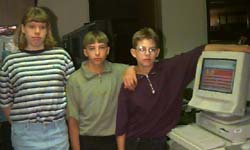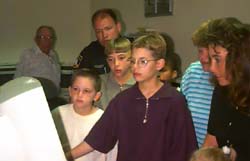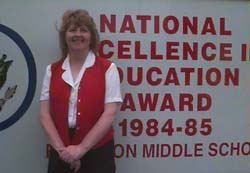



|
Strengthening school and community ties in Topeka
Onecia Mercer, a middle school technology teacher, brings students to the community and the community into the school By Heather Clopton SCR*TEC |
|
The Robinson Young Web Developers (YWDs), an after-school group formed under Onecia's guidance, work with the police to keep their parents, friends, and neighbors aware of the best ways to prevent crime. When police cars are parked in front of the building, no one is alarmed. In fact, the cars are a reassuring reminder that the kids who go to school here have a positive partnership with law enforcement. |
 Erin, Kris, and Eric, three of the Young Web Developers. |
Right now, there are four students who do the bulk of the work, Andrew, Eric, Erin, and Kris. With Onecia's leadership, these kids and a number of others began their journey onto the Web. Last fall, they assisted Onecia in the construction of the school's Web page. Onecia stayed one step ahead of the students, and when a problem was encountered or when they wanted to do something they didn't know how to do, they learned together. The homepage was completed in January, and when the kids showed up for their YWDs meeting the following Tuesday, they realized that they needed something new to work on. Onecia was eager to find another project for the kids, because, as she says, "Once they got through with the school's page . . . they were just then getting comfortable [with HTML]. And the project was over." The kids could really develop their newly-acquired skills if given the chance. |
|
Onecia was immediately receptive to the project--what a great idea! The kids would benefit in a number of ways. They would learn about the content, which could prove very useful to them throughout their lives. They would be providing a service to the community and interacting with the police often, so that anonymous law enforcement people would now be real people to them. Finally, they would be gaining real-world work experience. But could they deliver? |
 Eric shows the crime prevention site to friends, family, and a member of the Topeka Police Department, who also happens to be Kris's father. |
"I came in," he says, "and explained to the kids what my crime prevention logo was, what the philosophy of crime prevention was, and what I hoped to accomplish on the Web page. I told them that I have no idea what a Web page even looks like, because I didn't at the time, and I asked them to develop something." Then Onecia showed the kids the Dallas Police Department's homepage as a starting point in formulating their plans. After finding and analyzing a number of other law enforcement Internet sites, the kids devised a strategy for their Web site, which they presented to John. He was very pleased and encouraging. Together, they decided that the deadline for the project would be the end of the school year. |
|
"All of the sudden," observes Onecia, "everything that I'd been saying all along was now important. Because they were the ones that would look bad if something was misspelled or if there was some spacing problem or if the punctuation wasn't exactly right. So they would call me over, saying, 'Now is this how this is supposed to look?' And I thought, you know we haven't seen that before . . ." The keyboarding students did a great job getting the information into electronic form, and they learned about accountability and pride in their work along the way. Onecia had already decided that projects in her lab need to relate to work in another class or to be done for a practical purpose, and this project has strengthened her commitment to this way of teaching. Once the keyboarding was done, it was up to Andrew, Eric, Erin, and Kris to get the job done. They worked hard, sometimes putting in hours a day, to get the pages onto the Web. While Onecia was always in the background, guiding the kids, or, as Kris says, "getting them on track" (though he adds they didn't need to be put on track very often), they did all of the HTML and editing. |
 Onecia with Eric, Erin, and Kris with the certificates awarded to them by the Topeka police. |
What do the kids think they learned? Erin says she learned about how to put the Internet to good use. She knows now how it works and how to find the information she needs. Eric says, "I just learned more about my community, where I live, and what's going on." He has also become very conscious of typos in his own and others' work, as have Erin and Kris. He "can't stand reading something with a typo in it." Onecia agrees that the kids learned quite a bit, not just about the Web, but about themselves and what they can accomplish. Both this Web site and the Robinson homepage have been shown to parents, and the reaction, according to Onecia, is pleased astonishment: "Wow, the kids, look what they're doing! . . . Once they see that, they're very impressed." When the YWDs finished their work, they now had to present it to the client. The kids were nervous, but it went well, and the police department was very pleased. "I'm just real impressed with the way the whole thing went." John said. "It saved me hours and hours of time. . . . The kids were great. There was never any question from them as to what they needed to do they just jumped in and did it." |
|
|
 Onecia Mercer, the computer teacher at Robinson Middle School in the Topeka Public School District. |
While Onecia is enthusiastic about what technology can do, she recognizes that some teachers are intimidated by the new advances, and that the way to bring them in is not to force them. "I think . . . that for the people that aren't ready--that's fine. And just to be there and encourage them the first time they try [is enough]." |
|
|
|